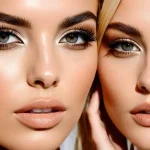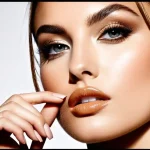Key Emerging Trends Shaping UK Women’s Fashion and Beauty
UK fashion trends for women are embracing a fusion of nostalgia and futurism. Emerging fashion styles prominently feature vintage-inspired silhouettes combined with modern fabrics, creating a unique blend seen both on runways and in urban street style. British beauty trends are similarly dynamic, with a marked shift towards sustainable, skin-friendly products that appeal to the eco-conscious consumer.
On the runway, designers are spotlighting bold prints and exaggerated textures, which are quickly influencing mainstream accessorising and layering techniques. Street style captures this innovation with a focus on comfort and individuality, including oversized outerwear and unexpected colour pairings that make fashion both practical and expressive.
Additional reading : How do British women maintain flawless skin in varying climates?
Women’s beauty innovations reflect advances in clean beauty and tech integration, such as multifunctional formulations offering skincare benefits alongside makeup. Techniques like glass skin and natural ‘no-makeup’ looks dominate, powered by products rich in natural ingredients and enhanced by tools like facial massagers and light therapy devices. These innovations underscore a preference for enhancing natural beauty rather than masking it, reflecting broader British beauty trends towards authenticity and wellness.
Cultural and Social Factors Driving Trend Evolution
Trends absorb the spirit of the times.
Additional reading : How do British cultural influences shape women’s fashion and beauty choices?
The cultural influence on fashion in the UK embodies its rich multicultural tapestry. Diverse communities bring unique styles that intermingle, creating dynamic, hybrid trends. This fusion reflects Britain’s evolving identity, where traditional norms meet global inspirations. Social trends in beauty similarly echo this cultural blend, embracing varied skin tones and beauty standards.
Social movements dramatically shape these trends. The rise of body positivity challenges narrow ideals, promoting inclusivity. Sustainability pushes the fashion industry toward ethical choices, influencing both production and consumer behavior. These shifting values demonstrate how society’s priorities directly impact what becomes fashionable and beautiful.
Regional and generational preferences contribute further nuance. Youth subcultures often pioneer bold innovations, while older generations may steer more classic or revivalist waves. Geographic diversity, from urban centers to rural areas, also colors trend adoption uniquely across the UK.
Ultimately, the intersection of UK diversity in style and social values establishes a vibrant, ever-changing landscape. Recognizing these cultural and social drivers reveals not just fashion and beauty trends, but evolving cultural narratives that resonate deeply.
Industry Voices: Experts, Brands, and Influencers Leading Change
Understanding the fashion industry insights in the UK requires attention to the voices shaping its trajectory. Leading designers and trending brands UK continuously redefine aesthetics by blending tradition with innovation. Experts note a growing emphasis on sustainability and individuality, reflecting broader cultural shifts.
In the beauty realm, beauty influencers UK play a pivotal role in steering consumer preferences. Their endorsements often boost visibility for emerging products, accelerating market trends. By sharing authentic experiences, these influencers cultivate trust and spark engagement, influencing purchasing decisions.
Celebrity collaborations further amplify this effect. When high-profile figures partner with trending brands UK, the resulting buzz can transform niche products into mainstream sensations almost overnight. This synergy between celebrities and brands fuels rapid trend acceleration, demonstrating the power of endorsement in shaping the industry.
Collectively, the perspectives of industry veterans, creative innovators, and active influencers form a dynamic ecosystem. This network drives continual evolution in women’s fashion and beauty, forging a vibrant future that balances heritage and modern demand.
Economic Factors and Technological Innovation in UK Fashion and Beauty
The fashion economy UK is currently influenced by a dynamic interplay between economic conditions and technological advances. In times of economic uncertainty, consumers show increased sensitivity towards affordability in fashion, opting for brands that balance style with cost-effectiveness. This shift has accelerated the rise of affordable, accessible brands that cater to budget-conscious shoppers without compromising on quality or trends.
Simultaneously, the integration of technology has transformed how consumers engage with beauty and fashion products. Emerging beauty tech trends, such as virtual try-ons, enable shoppers to experiment with looks from home, enhancing confidence in online purchases. These tools reduce the uncertainty typically associated with buying beauty products without in-person testing.
Sustainability is another technological frontier impacting the UK market. Innovations in product development focus on eco-friendly ingredients and packaging, aligning with consumer demand for responsible choices. This combination of economic practicality and technological innovation is reshaping purchasing behaviour, making fashion and beauty more accessible while maintaining sophistication and environmental consciousness.
Case Studies: Real-World Trend Adoption Across the UK
Women across the UK showcase unique interpretations of UK street style, blending traditional influences with modern twists. In cities like Manchester, Liverpool, and London, fashion trend examples UK reveal varying levels of boldness and subtlety. For example, oversized blazers and statement boots have been embraced enthusiastically in Liverpool, emphasizing a mix of comfort and edge. Meanwhile, beauty adoption stories from Glasgow highlight the rise of natural makeup looks paired with striking accessories, demonstrating a local preference for understated glamour.
Local designers and beauty entrepreneurs have seized these shifts, launching collections that reflect real consumer preferences. A London-based label recently introduced sustainable fabrics tailored to the UK street style while a beauty startup in Brighton captured attention by creating inclusive skincare solutions inspired by diverse beauty adoption stories within their community.
Public feedback to recent fashion weeks and beauty product launches underscores a growing demand for authenticity and sustainability. Attendees praised innovative designs but called for more accessibility in pricing. This dynamic demonstrates how current trends spark both excitement and critical engagement, shaping the future of UK fashion and beauty industries.







